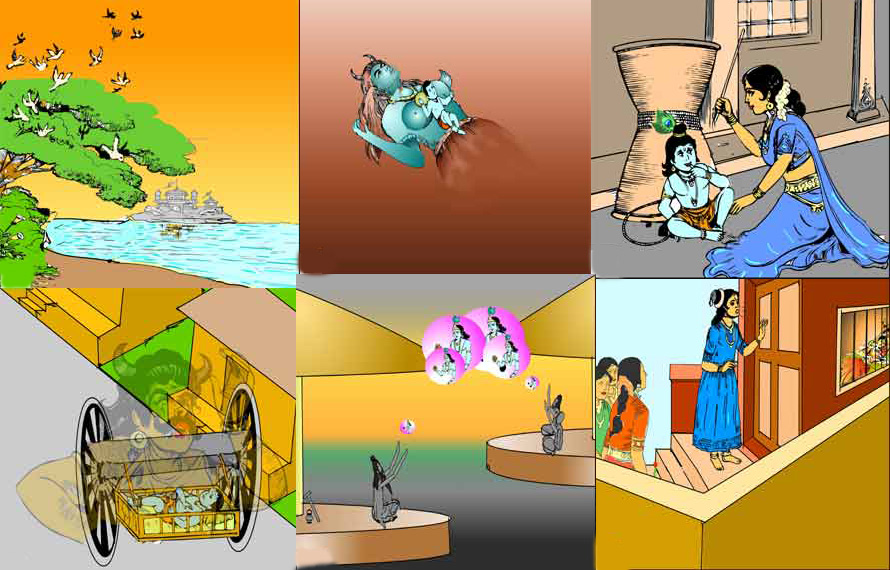திருப்பாவை - 6 (புள்ளும் சிலம்பினகாண்)
புள்ளும் சிலம்பினகாண்; புள்ளரையன் கோயிலில்
வெள்ளை விளிசங்கின் பேரரவம் கேட்டிலையோ?
பிள்ளாய்! எழுந்திராய், பேய்முலை நஞ்சுண்டு,
கள்ளச் சகடம் கலக்கழியக் காலோச்சி,
வெள்ளத்தரவில் துயிலமர்ந்த வித்தினை,
உள்ளத்துக் கொண்டு முனிவர்களும் யோகிகளும்
மெள்ள எழுந்து அரியென்ற பேரரவம்
உள்ளம்புகுந்து குளிர்ந்தேலோ ரெம்பாவாய்.

Explanation
Hey children (piLLaay)! See (kaaN) the birds (puL) are chirping (silambina).
Don't you hear (kEttilaiyO), the loud (pEr) sound (aravam) of the white
(veLLai) conch (sangu), used for callings (viLi) the people, at the temple
(kOyil) of the king (araiyan) of the birds (puL); The yogis (yOgi) and the
saints (munivar) who are slowly (meLLa) waking (ezhundhu) with (kondu) the
thought of Lord in their minds (uLLam) and uttering the name of the Lord. The
Lord who ate (uNdu) the poison (nachchu) from the breast (mulai) of the
raakshasi Bhutan (pEy); who kicked (kaalOchchi) and destroyed (kalakkazhiya)
the asura Sakatasura, who came as a fake (kaLLa) wheel (chakatam); the source
of all life (viththu), who is in yogic sleep (thuyil amarndha) over the snake
(aravu) on the ocean (veLLaththu) of milk. The big (pEr) sound (aravam) of the
name of the Lord (ari) has entered (pugundhu) our hearts (uLLam) and made it
calm (kuLirndhElOr).
Purport
Young girls, don't you hear the chirp of the early birds? The beckoning sound of the white conch from the temple of Vishnu who rides on the king of birds, Garuda? Wake up, innocent girl! The sages and ascetics with their minds ever focused on the great Lord, who sleeps on the serpent-couch in the ocean of milk, have risen. These sages have started chanting the name 'Hari' over and over again, in a rising crescendo. While they chant His name, no doubt, they are reenacting in their own minds the deeds of the child-God who sucked the poison from the breast of the demoness Putana and who kicked to death, with his little toe, the demon that came to destroy Him in the guise of a cart. Don't you hear all the loud chanting which enters our hearts and makes them rejoice?
More Insight
The girls approach the mansion of a gopi and wake her up by indicating signs of early dawn, "Even the birds are up and chirping. Get up." The sleeping girl rejects this reason, "oh girls, you never allow the birds in your town to sleep, with your chanting of His names and making them chant too. This is no sign of dawn!" Then they mention a noteworthy sign," PULLARAYAN KOIL etc... The blowing conch in the temple of Vishnu for early morning worship, is inviting us all for His service. Get up."
Here the phrase PULLARAYAN KOIL brings out an excellent quality of the Lord: PUL is bird, here Garuda; ARAYAN king; KOYIL temple. The temple of Vishnu. But why this circumlocution? There is a reason. In Ramayana while narrating to Hanuman her abduction by Ravana, Sita says, "On that fateful day I was lured by that demon disguised as a deer, and was separated from Rama's younger brother and Lakshmana's elder brother (RAMANUJAM LAKSMANA POORVAJAM CHA)." Such phraseology is used for a purpose. The Lord feels happy when His name is coupled with His devotee's and so does the devotee when he is referred to as being subservient to the Lord. The message of Sita (Sri Devi) and Andal (Bhu Devi) to us is that when a Sri Vaishnava names his child he should follow this principle.
ULLATHU KKONDU etc in this verse is noteworthy. The munis and yogins get up in the morning very slowly from their beds so that the Lord, taking eternal abode in their hearts may not be disturbed. Prahlada was pushed down from the top of a huge mountain, and while falling he held fast his bosom with great concern for Sri Hari living there never bothering about what was happening to himself. But the Lord waited for him at the bottom of the mountain and received him in his spread arms.
Parasara Bhattar used to embellish his body with silken robe, ornaments, sandal paste etc, and when asked about its propriety in respect of the despicable body, he said in his view it was not despicable but adorable being the sanctum sanctorum of the Almighty.
Andal also leaves this lesson in this verse: When you get up in the morning; chant the name of Hari (HARIR HARIR HARIRITI VYAHARET VAISHNAVAH PUMAN). Let us do so.
Click title to hear the song by Sudha Raghunathan (Ragam: Shankarabharanam Talam: Mishra Chapu )
No comments:
Post a Comment